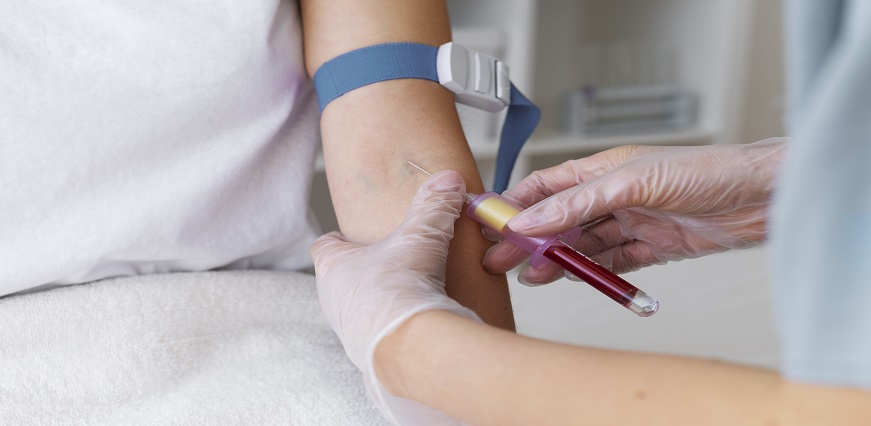

Max Lab > Lab Test in Varanasi > Lab Test in Paharia > Progesterone Test
₹ 600
25% OFF ON ABOVE PRICE | USE CODE ML25 *
|
|
Progesterone Test |
|
|
PDG Test, Progesterone Serum Test, Progesterone Blood Test |
|
|
Blood |
|
|
No specific preparation required
|
|
|
|
|
₹ 600 |
@3x.png) Description
Description
A progesterone test in Paharia, Varanasi is prescribed by the doctor to measure the level of progesterone in the blood. It is a hormone that is produced in the ovaries of women and plays a critical role in pregnancy. The progesterone level test in Paharia, Varanasi helps in determining the ovulation cycle of a woman. Usually, this lab test in Paharia, Varanasi is recommended for women having fertility issues, during pregnancy, miscarriage, or uterus-related medical conditions.
Progesterone is a hormone produced by the ovaries of women that has an important function in preparing the uterus to support fertilized eggs. It also helps in preparing women's breasts to make milk. The level of progesterone varies during the menstruation cycle of women. When the ovary releases eggs, then the progesterone level increases in the body. If the woman does not conceive, then the progesterone level goes down and the monthly period cycle starts.
A progesterone serum test in Paharia, Varanasi is used to measure the progesterone level in the blood. Usually, a progesterone test in Paharia, Varanasi is prescribed by a medical practitioner to check the overall health of a woman during pregnancy, diagnose any complications in conceiving, and find out the cause of abnormal bleeding during the period cycle. A pregnant woman has a 10 times higher level of progesterone in comparison to other women. It is also important to note that progesterone hormone is also released in men but in a much lower amount which is produced by the adrenal gland and test in Paharia, Varanasies.
One can book a progesterone test in Paharia, Varanasi from Max Lab online and call the phlebotomist for at-home blood sample collection. All the test in Paharia, Varanasi prices at Max Lab, including progesterone test in Paharia, Varanasis, are kept affordable, which is well within the reach of the average person.
....Read More@3x.png) Description
Description
A progesterone test in Paharia, Varanasi is prescribed by the doctor to measure the level of progesterone in the blood. It is a hormone that is produced in the ovaries of women and plays a critical role in pregnancy. The progesterone level test in Paharia, Varanasi helps in determining the ovulation cycle of a woman. Usually, this lab test in Paharia, Varanasi is recommended for women having fertility issues, during pregnancy, miscarriage, or uterus-related medical conditions.
Progesterone is a hormone produced by the ovaries of women that has an important function in preparing the uterus to support fertilized eggs. It also helps in preparing women's breasts to make milk. The level of progesterone varies during the menstruation cycle of women. When the ovary releases eggs, then the progesterone level increases in the body. If the woman does not conceive, then the progesterone level goes down and the monthly period cycle starts.
A progesterone serum test in Paharia, Varanasi is used to measure the progesterone level in the blood. Usually, a progesterone test in Paharia, Varanasi is prescribed by a medical practitioner to check the overall health of a woman during pregnancy, diagnose any complications in conceiving, and find out the cause of abnormal bleeding during the period cycle. A pregnant woman has a 10 times higher level of progesterone in comparison to other women. It is also important to note that progesterone hormone is also released in men but in a much lower amount which is produced by the adrenal gland and test in Paharia, Varanasies.
One can book a progesterone test in Paharia, Varanasi from Max Lab online and call the phlebotomist for at-home blood sample collection. All the test in Paharia, Varanasi prices at Max Lab, including progesterone test in Paharia, Varanasis, are kept affordable, which is well within the reach of the average person.
....Read More
Have you ever heard of the TLC test? The TLC test is a medical procedure that...Read More

Are you constantly feeling fatigued, catching every bug that comes your way, ...Read More

Welcome to our blog post on myositis - a condition that affects the muscles a...Read More

Psoriasis is an autoimmune skin disorder that leads to itchiness and sometime...Read More

Multiple Sclerosis (MS) is an autoimmune disorder that affec...Read More

Autoimmune diseases affect millions of people worldwide, yet many remain unaw...Read More